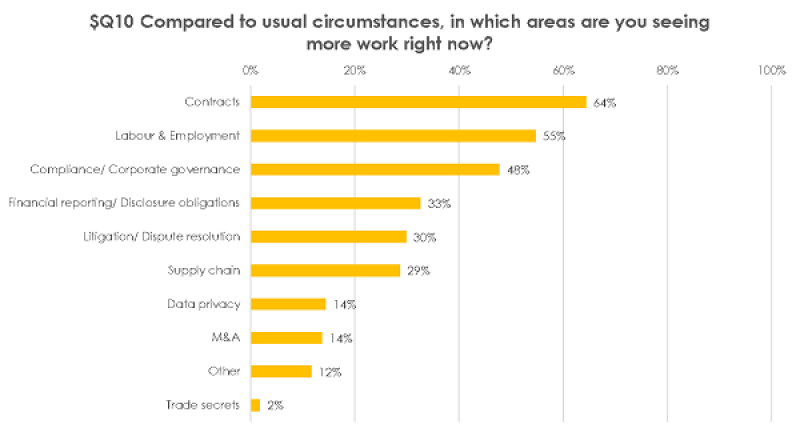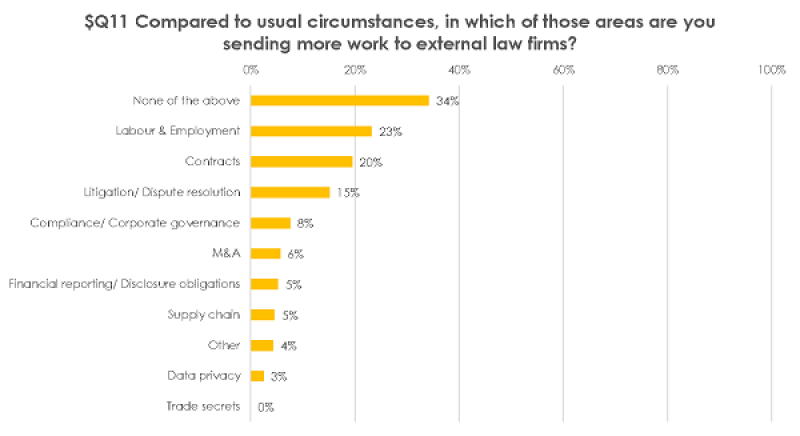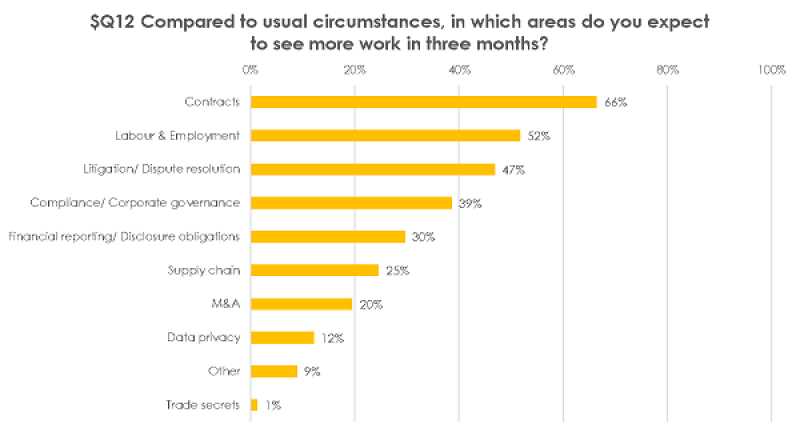Law firms globally can expect in-house counsel to send them a wave of COVID-created litigation work in the next three months despite some external lawyers being asked to reduce their rates, according to a comprehensive survey by Euromoney’s Legal Media Group (LMG) and Euromoney Thought Leadership Consulting.
In May, LMG – whose titles include Managing IP, ITR and IFLR – surveyed 435 senior legal and company officials about the impact of COVID-19 on their legal work. General counsel, heads of legal and other figures including chief executives, all from a range of countries and industries and companies of various sizes, took part.
In asking what type of work counsel will send to external law firms in the next three months, we found that nearly a third (31%) of respondents will be keeping advisers busy with litigation/dispute resolution. This represented a significant jump from the 15% figure when we asked the same question but applied it to the situation today.
Q13 LMG survey chart
COVID workload
To understand the pandemic’s impact on legal teams, the survey asked respondents how much of their current workload is directed to COVID-19 – and nearly everyone (90%) said they have been affected to one degree or another.
More than a third (38%) answered 1 to 10%, in what was comfortably the most popular response, and even a tenth said that none of their work is focused on COVID. Given the ructions caused by the pandemic, it may seem surprising that the legal effects have not gone deeper.
However, beyond the most common answer of 1 to 10%, the remaining bands of 11 to 25%; 26 to 50%; 51 to 75%; and even more than 75% took some share of the vote.
Financial impact
Budgets
Digging further, the survey asked about the impact on legal budgets. Two thirds of respondents (66%) said that their budget has been unaffected by COVID, with nearly a fifth (18%) revealing theirs has been “somewhat reduced” and 7% answering “significantly reduced”. Just 8% have seen an increase.
However, while budgets may not have been slashed just yet, companies have not seen anywhere near the full economic impact of COVID, making it feasible that in six months to a year’s time, these figures would look very different.
Legal staff
On the (related) question about how legal department staff have been affected, the findings are even more emphatic – 88% of respondents said there has been no change. Again, however, the full economic impact is largely unknown, and many companies may have benefitted from government furlough schemes where the state pays a share of employees’ salaries, so the true effects may not be seen for some time.
Incidentally, on the issue of COVID-induced furloughs, nearly a fifth of respondents (19%) said that if a law firm were to take advantage of such schemes, in-house counsel would send less work their way. A small portion (13%) revealed that pay cuts to associates and other staff would trigger the same response.
External fees
Regarding the amount of work sent to external law firms, the interesting figure is that 20% of respondents said they have “somewhat increased” it. When you consider that very few respondents (7%) previously said that their legal budget has increased, it raises the question of whether some firms are taking on extra work at reduced rates or even for free.
Companies’ responses
The answer to this can be inferred from the next set of findings, which followed a question about companies’ responses to the COVID-19 crisis. A fifth (20%) said they have asked external law firms to reduce their rates; in light of the above-mentioned discrepancy between budgets and workload, it would seem that some have obliged. In addition, 41% said they have put transactions on hold, while nearly a third (29%) have stalled key legal department initiatives.
Changing landscape
With COVID reshaping business and society, the type of work that in-house counsel are doing is changing. According to a majority of respondents (64%), the extra work created since the pandemic is on contracts. Next was labour and employment (55%), and the third most popular answer was compliance/corporate governance, at just under half (48%).
There was then a fairly even spread among the other options, including financial reporting/disclosure obligations, litigation/dispute resolution, and supply chain. Interestingly, just 2% of respondents picked trade secrets. While these issues may appear insignificant for now, the nature of home-working and the potential for employees to become demoralised could raise the risk of trade secrets and confidential information being breached during lockdowns and their aftermath.

Keeping advisers busy
Illustrating how the extra work largely tallies with new matters sent to external lawyers, the survey found that labour and employment (23%), and contracts (20%) both account for the biggest new workloads that counsel are shipping out. Having said that, there is a large discrepancy between current extra work on contracts (64%) and that being sent to law firms (20%), possibly suggesting that contractual work gets stuck in-house before needing expert advice.
Compliance/corporate governance accounted for just 8% of the new work for external firms, despite being the third most popular new work stream overall (48%).
Interestingly, while 30% of respondents said they are currently doing more litigation/dispute resolution work, just 15% said they are sending this work to external firms. Presumably this means that in some cases, in-house counsel are not sending litigation work out just yet, perhaps because these disputes are in the early stages where negotiations are ongoing.

Three months’ time
When asked about expected increases in work in the next three months, litigation/dispute resolution came third with 47%, which is 13% higher than for the current situation.

It sparks the key question of why companies expect more disputes in three months. One possible answer is that litigation is on the rise because of tensions in a number of industries – after all, we had respondents from corporate and capital markets, to automotive and transportation, consumer products and retail, to oil and gas. Another is that in-house counsel may be expecting to send the existing litigation work (which is perhaps in the early stages) to external firms soon – a finding seemingly backed up by the figure that 31% will be handing disputes over to external firms within three months.
The other notable change is the 6 percentile rise in expected M&A work – from 14% today to 20% in three months. And this looks likely to be transferred to external advisers, as M&A work sent to law firms will spike (from 6% to 12% of the vote), according to our findings. In three months’ time, law firms can also expect to get more contractual work (28% of the vote, up 8 percentage points from today) and labour and employment matters (25%, a rise of 2 percentage points).
As law firms prepare for more work in certain areas, it would seem that keeping clients abreast of the latest COVID developments won’t do anything to harm them – as, according to our survey, respondents were indifferent when asked whether there is too much COVID content from firms, and most said that it is appropriate.
To read more Managing IP content on COVID-19, visit our resource hub, which is being updated regularly.











